from Apr. 18, 1865
Office of Agent For C.S. Prisoners
-
Full Title
Office of Agent For C.S. Prisoners
-
Description
Letter sent by a Confederate prisoner of war named WM. S. Hawkins. Hawkins was a Confederate army colonel who was confined to Camp Chase, one of the largest POW camps in the Northern states. Hawkins expresses his regrets in regards to President Lincoln's fate, while voicing a desire for a post-war world in which the country was unified under principles of justice, mercy, and kindness.
-
Transcription
Office of Agent for C.S Prisoners, Camp Chase, Ohio, April, 18th 1865.
I desire, through your columns, to express my profound abhorrence of the deeds resulting in the death of President Lincoln. I wish also to mention that in passing through the prisons, where are still confined several thousand of my comrades, I heard of no one so fallen from the level of our common humanity as to be in any sense gratified at this atrocious murder. The sentiment on every side was that of indignation at so cowardly an attempt, and of regret at its successful completion.
In the name of Right, let the obloquy and the punishment fall in united horror upon the guilty, but not upon men who have had neither part nor lot in the matter; who, in other affairs, may have erred in judgement, but certainly not in heart, since countless sacrifices attest their sincerity; and whose strength, in case of ultimate Federal success, can be merged once more in the common resources far more readily by the Divine policy of brotherly kindness, than by any exercise of bitter and vindictive feeling.
Over the ark of a wise Government two seraphs bend - one of these is clear-eyed Justice, but the other is warm-hearted Mercy.
I am, sirs, very respectfully, your obedient servant,
WM. S. HAWKINS
Colonel, C.S.A. -
Rights
This item is in the public domain and may be reproduced and used for any purpose, including research, teaching, private study, publication, broadcast or commercial use, with proper citation and attribution.
-
Tags
-
Cite this Item
WM. S. Hawkins. "Office of Agent For C.S. Prisoners". The Louisville Daily Journal. Remembering Lincoln. Web. Accessed December 15, 2025. https://rememberinglincoln.fords.org/node/1204
-
Creator
WM. S. Hawkins
-
Publisher
The Louisville Daily Journal
-
Date
April 18, 1865
from Apr. 18, 1865
Office of Agent For C.S. Prisoners
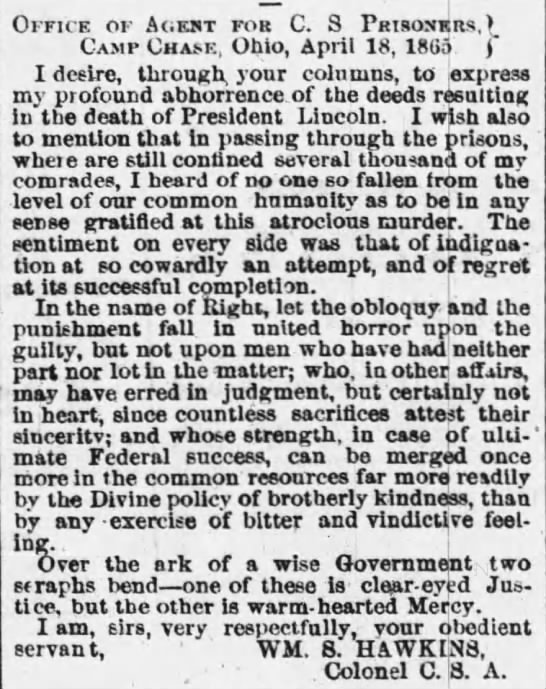
-
Description
Letter sent by a Confederate prisoner of war named WM. S. Hawkins. Hawkins was a Confederate army colonel who was confined to Camp Chase, one of the largest POW camps in the Northern states. Hawkins expresses his regrets in regards to President Lincoln's fate, while voicing a desire for a post-war world in which the country was unified under principles of justice, mercy, and kindness.
-
Rights
This item is in the public domain and may be reproduced and used for any purpose, including research, teaching, private study, publication, broadcast or commercial use, with proper citation and attribution.
-
Creator
WM. S. Hawkins
-
Publisher
The Louisville Daily Journal
-
Date
April 18, 1865
from Apr. 16, 1865
Sermon Preached in the African Methodist Episcopal Zion Church
-
Full Title
Sermon Preached in the African Methodist Episcopal Zion Church
-
Description
Sermon preached by Rev. Jacob Thomas in the African Methodist Episcopal Zion Church, Troy, New York. In this sermon, Rev. Thomas addresses his congregation and praises Lincoln as a true friend of African Americans while discussing what his loss means for the future. Rev. Thomas reflects on the grief of the African American community in regards to the assassination and how this was enhanced by Lincoln's status as a "friend of the oppressed."
-
Transcription
My friends, we meet at this hour with sad hearts. We have been stricken. The blow has fallen heavily upon us, and a nation mourns to day. Truly a prince and a great man in Israel has fallen. We cannot but weep bitter tears that so great and good a man as Abraham Lincoln, has been cut down in the midst of his usefulness by a death so cruel. At the moment he was about to realize the great results of his four years labor, just as victory had perched upon our banners, he fell a martyr to freedom. We shall never look upon his like again.
A few days ago joy and gladness filled every heart. All who were loyal to the government rejoiced and gave thanks to Almighty God because of the victory won, the downfall of the rebel capital. This intelligence was too glorious to be unalloyed. Ere our joy had subsided, sorrow overtook us. News reached us from Washington of the bloody deed perpetrated there. We would not believe it. It could not be possible that a creature in the form of man could be found so God-forsaken, as to take the life of the man who had malice for none but charity for all! The hours between the first rumor and the confirmation of the report, were hours of dreadful suspense. But the truth came at last. There was no longer room for doubt. It was too true, that on last Friday evening, whilst enjoying at a place of amusement a few moments of relaxation from toil, accompanied by his wife and a few friends, unconscious of danger near, he was brutally murdered — shot down by the cowardly hand of an assassin. Palsied be the tongue, withered be the arm of the guilty, execrable wretch who committed this, the blackest of all crimes. Yes, our dear President is no more. The beloved of his country, the father and friend of the oppressed, the champion of universal freedom, has fallen a victim to southern malice and revenge. Kind heaven weeps to-day over the bloody spectacle.
We, as a people, feel more than all others that we are bereaved. We had learned to love Mr. Lincoln as we have never loved man before. We idolized his very name. We looked up to him as our saviour, our deliverer. His name was familiar with our children, and our prayers ascended to God in his behalf. He had taught us to love him. The interest he manifested in behalf of the oppressed, the weak and those who had none to help them, had won for him a large place in our heart. It was something so new to us to see such sentiments manifested by the chief magistrate of the United States that we could not help but love him. Is it to be wondered at that we mourn today? Nay, we have seen old gray-headed men and young maidens weep because of this affliction. Had disease attacked him and he had passed away according to the natural course of nature, we could have consoled ourselves with the thought that it was God's will it should be so. But falling as he did by the hand of the wicked, we derive our consolation only from the assurance that by his uprightness, his honesty and his principles of Christianity, he is now enjoying that rest that remains for the just.
Our text is a fitting one for the occasion. A great man has fallen. From whatever stand-point we view Mr. Lincoln, we find in him the marks of true greatness. A few years ago this plain, homely lawyer was scarcely known outside of his own state. But how soon did he become the point of attraction. Not only was he the centre of observation in this country, but the civilized world was watching him. He far exceeded the expectations of all men. He became as the ark of safety to his country, the praise and glory of his fellow men. To us as a despised people, he was a second Moses — a second Daniel in wisdom. From a humble position in life he reached the very summit of honor, occupied the highest seat that it was in the power of the American people to give him, and filled that seat as no man ever filled it before him. The mind that conceived and drew up the Proclamation of Emancipation was a great mind. The results of this grand deed are patent to all. He was a philanthropist in the most extensive sense of the word — benevolent, kind, and ever ready to make others happy. One of the most prominent features in the character of our departed friend was his merciful disposition even towards his foes. He was strictly honest; this is admitted by his worst enemies. " Honest Abe," he was familiarly called by all classes. He was honest with his people, honest to himself, honest to his God. This is what God requires of all men, to be honest in heart. The exterior of this great man may have been plain, homely and awkward, but the interior was beautifully finished and furnished with Christian graces. It was his reliance upon God that carried him safely through the storm of four years duration. It was this that has made him blessed in the favor of God, forever.
Yes, Abraham Lincoln is no more, and we mingle our tears with those of the mourning widow and bereaved friend. We feel that in his loss our punishment is more that we can bear, yet in God is our consolation. Let us hope for the best. An all-wise God has permitted this great grief to come upon us. Let us look to him for deliverance in the time of our distress. We are humbled, we are mortified, we are brought very low. Our trust must be in God. Whilst we mourn, he whose, death we deplore, is enjoying the reward of his labor, happy with his God, mingling with those kindred spirits who went before him. The
two truest and greatest men that ever lived on earth, John Brown and Abraham Lincoln, have met in glory, and they cease not to give praise and honor to him that liveth forever and ever. The memory of Abraham Lincoln will ever be dear to us. It is engraved upon our hearts. It can never be effaced. He has been our true friend and we never can forget him. We feel as though God had raised him up for a special purpose, and that having accomplished the labor assigned him, he has gone to his rest. May God protect us and keep us from further evils. -
Source
A tribute of respect by the citizens of Troy, to the memory of Abraham Lincoln
-
Rights
This item is in the public domain and may be reproduced and used for any purpose, including research, teaching, private study, publication, broadcast or commercial use,with proper citation and attribution.
-
Tags
-
Cite this Item
Rev. Jacob Thomas. "Sermon Preached in the African Methodist Episcopal Zion Church". Young & Benson. Remembering Lincoln. Web. Accessed December 15, 2025. https://rememberinglincoln.fords.org/node/1203
-
Creator
Rev. Jacob Thomas
-
Publisher
Young & Benson
-
Date
1865
from Apr. 16, 1865
Sermon Preached in the African Methodist Episcopal Zion Church
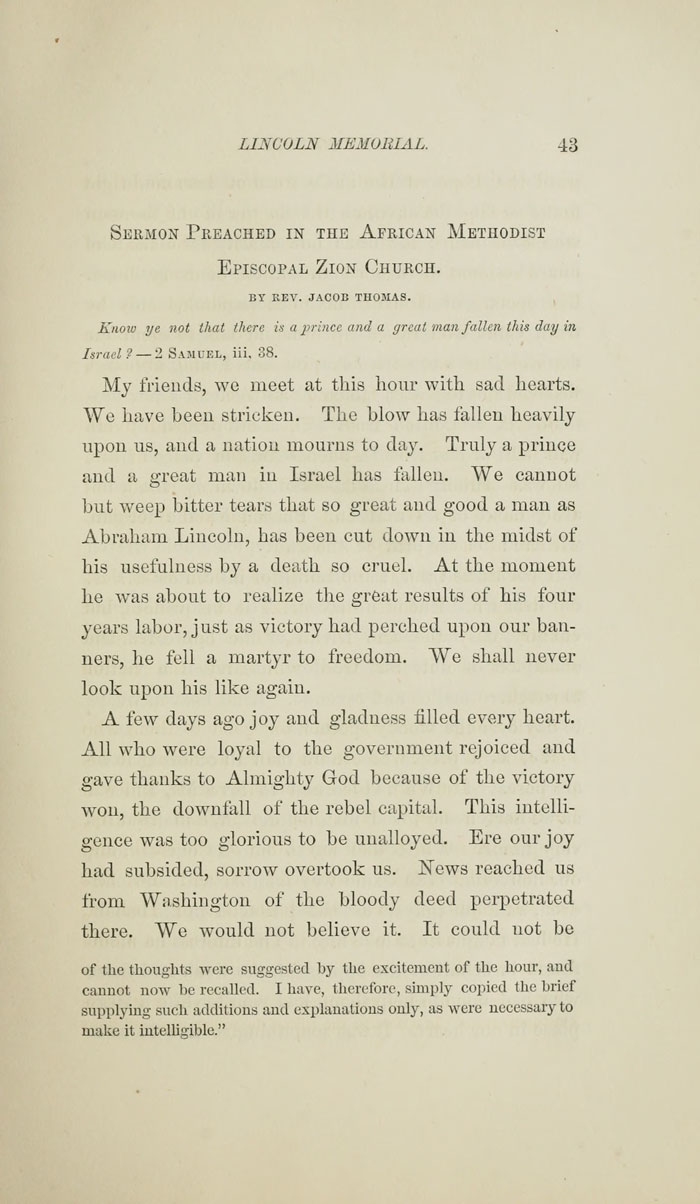
-
Description
Sermon preached by Rev. Jacob Thomas in the African Methodist Episcopal Zion Church, Troy, New York. In this sermon, Rev. Thomas addresses his congregation and praises Lincoln as a true friend of African Americans while discussing what his loss means for the future. Rev. Thomas reflects on the grief of the African American community in regards to the assassination and how this was enhanced by Lincoln's status as a "friend of the oppressed."
-
Source
A tribute of respect by the citizens of Troy, to the memory of Abraham Lincoln
-
Rights
This item is in the public domain and may be reproduced and used for any purpose, including research, teaching, private study, publication, broadcast or commercial use,with proper citation and attribution.
-
Creator
Rev. Jacob Thomas
-
Publisher
Young & Benson
-
Date
April 16, 1865
from Apr. 15, 1865
General Schultz to Colonel Wagnerd
-
Full Title
General Schultz to Colonel Wagnerd
-
Description
In light of the assassination of Abraham Lincoln, General S. Schultz informs Colonel Louis Wagnerd that a celebratory parade for the end of the war in Pennsylvania would not go on as planned.
-
Transcription
Head Quarters.
Department of Pennsylvania,
Philadelphia, Pa. April 15th 1865.
Lt: Col: Louis Wagnerd
Comidg Camp "William Penn"
Chelten HIlls, Penna
Colonel
I am directed by the Commanding General to inform you the proposed parade of of he U.S. Troops in this city will not take place on monday next 17" isnt. on account of the sad news received this morning. You will therefore not be required to furnish the men from your command, for that purpose as requested, by the letter dated from these Head Quarters April 14" 1965.
I am Colonel,
Very Respectfully
Your Ob'd't Servant
Gnl. S. Schultz
Ap't Adj't General -
Source
U.S. National Archives, Records of the Provost Marshal General's Bureau
-
Rights
This item is in the public domain and may be reproduced and used for any purpose, including research, teaching, private study, publication, broadcast or commercial use, with proper citation and attribution.
-
Tags
-
Cite this Item
National Archives. "General Schultz to Colonel Wagnerd". Records of the Provost Marshal General's Bureau. Remembering Lincoln. Web. Accessed December 15, 2025. https://rememberinglincoln.fords.org/node/1199
-
Creator
National Archives
-
Publisher
Records of the Provost Marshal General's Bureau
-
Date
1865-04-15
from Apr. 15, 1865
General Schultz to Colonel Wagnerd
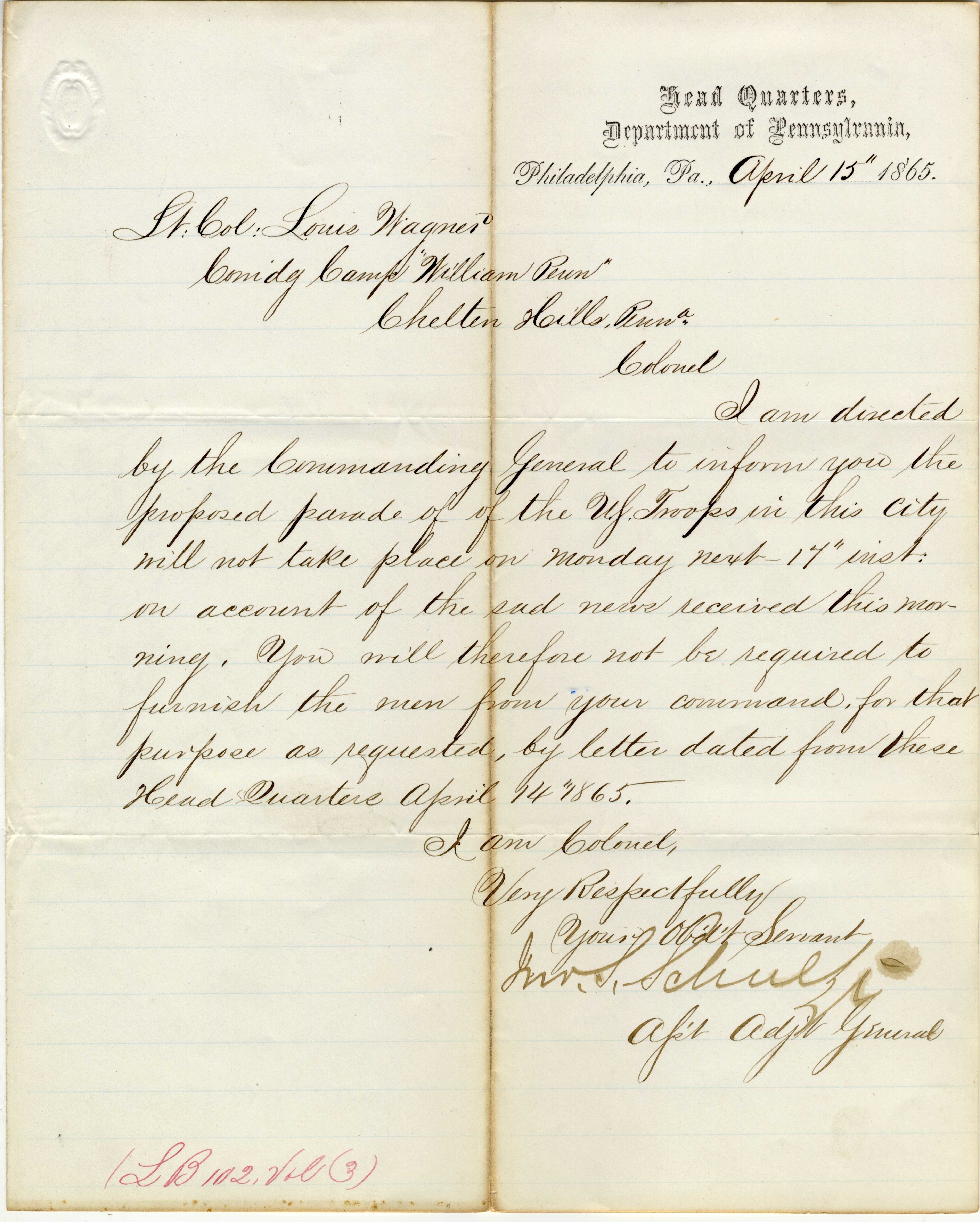
-
Description
In light of the assassination of Abraham Lincoln, General S. Schultz informs Colonel Louis Wagnerd that a celebratory parade for the end of the war in Pennsylvania would not go on as planned.
-
Source
U.S. National Archives, Records of the Provost Marshal General's Bureau
-
Rights
This item is in the public domain and may be reproduced and used for any purpose, including research, teaching, private study, publication, broadcast or commercial use, with proper citation and attribution.
-
Creator
National Archives
-
Publisher
Records of the Provost Marshal General's Bureau
-
Date
April 15, 1865
from Apr. 23, 1865
The Lesson of President Lincoln's Death
-
Full Title
The Lesson of President Lincoln's Death: A Speech of Wendell Phillips at the Tremont Temple, on Sunday Evening, April 23, 1865
-
Description
Abolitionist Wendell Phillips delivered this speech at Tremont Temple baptist church in Boston in the days after the Lincoln assassination. Phillips calls for African American rights as part of Lincoln's legacy.
-
Transcription
THE LESSON OF PRESIDENT LINCOLN’S DEATH: A SPEECH OF WENDELL PHILLIPS,
At the Tremont Temple, on Sunday Evening, April 23, 1865.
These are sober days. The judgments of God have found us out. Years gone by chastised us with whips; these chastise us with scorpions. Thirty years ago, how strong our mountain stood, laughing prosperity on all its sides! None heeded the fire and gloom which slumbered below. It was nothing that a giant sin gagged our pulpits; that its mobs ruled our streets, burnt men at the stake for their opinions, and hunted them like wild beasts for their humanity. It was nothing, that, in the lonely quiet of the plantation, there fell on the unpitied person of the slave every tortue which hellish ingenuity could devise. It was nothing that as husband and father, mother, and child, the negro drained to its dregs all the bitterness that could be pressed into his cup; that, torn with whip and dogs, staved, hunted, tortured, racked, he cried, “How long! O Lord, how long!” In vain did a thousand witnesses crowd our highways, telling to the world the horrors of this prison-house. None stopped to consider, none believed. Trade turned away its deaf ear; the Church gazed on them with stony brow; Letters passed by with mocking tongue. But what the world would not look at, God has set to-day in a light so ghastly bright, that it almost dazzles us blind. What the world refused to believe, God has written all over in the face of the continent, with the sword’s point, in the blood of our best and most beloved. We believe the agony of the slave’s hovel, the mother, and the husband, when it takes its seat at our board We realize the barbarism that crushed him in the sickening and brutal use of the relics of BUll RUn, in the torture and starvation of Libby Prison, where idiocy was mercy, and death was God’s best blessing; and now, still more bitterly, we must it in the coward spite which strikes an unarmed man, unwarned, behind his back; in the assassin fingers which dabble with bloody knite at the throats of old men on sick pillows. O, God! Let this lesson be enough! Spare us any more such costly teaching!
This deed is but the result, and fair representative, of the system in whose defence it was done. No matter whether it was previously approved at Richmond, or whether the assassin, if he reaches the confederates, be received with all honor, as the wretch Brooks was, and as this bloodier wretch will surely be, wherever rebels are not dumb with fear of our cannon. No matter for all this. God shows this terrible act to teach the nation, in unmistakable terms, the terrible foe with which it has to deal. But for this fiendish spirit, North and South, which holds up the rebellion, the assassin had never either wished or dared such a deed. This lurid flash only shows us how black and wide the cloud from which it sprung.
And what of him in whose precious blood this momentous lesson is writ? He sleeps in the blessings of the poor, whose fetters God commissioned him to break. Give prayers and tears to the desolate widow and the fatherless; but count him blessed far above the crowd of his fellow-men. [Fervent cries of “Amen!”] He was permitted himself to deal the last staggering blow which sent rebellion reeling to its grave; and then, holding his darling boy by the hand, to walk the streets of its surrendered capital, while his ears drank in praise and thanksgiving which bore his name to the throne of God in every form piety and gratitude could invent; and finally, to steal the sure triumph of the cause he loved with his own blood. He caught the first notes of the coming jubilee, and heard his own name in every one. Suppose that, when a boy, as he floated on the slow current of the Mississippi, idly gazing at the slave upon its banks, some angel had lifted the curtain, and shown him, that, in the prime of his manhood, he should see this proud empire rocked to its foundation in the effort to break those chains; should himself marshal the hosts of the Almighty in the grandest and holiest war that Christendom ever knew, and deal, with half-reluctant hand, that thunderbolt of justice which would smite the foul system to the dust; then die, leaving a name immortal in the study pride of our race and the undying gratitude of another, — would any credulity, however sanguine, any enthusiasm, however fervid, have enabled him to believe it? Fortunate man! He has lived todo it! [Applause.] God has graciously withheld him from any fatal misstep in the great advance, and withdrawn him at the moment which his star touched its zenith, and the nation needed a sterner hand for the work God gives it to do.
No matter now, that, unable to lead and form the nation, he was contented to be only its representative and mouthpiece; no matter, that, with prejudices hanging about him, he groped his way very slowly and sometimes reluctantly forward; let us remember how patient he was of contradiction, how little obstinate in opinion, how willing, like Lord Bacon, “to light his torch at every man’s candle.” With the least possible personal hatred; with too little sectional bitterness, often forgetting justice in mercy; tender-hearted to any misery his own eyes saw; and in any deed which needed his actual sanction, if his sympathy had limits, recollect he was human, and that he welcomed light more than most men, was more honest than his fellows, and with a truth to his own convictions such as few politicians achieve. With all his shortcomings, we point proundly to him as the natural growth of democratic institutions. [Applause.] Coming time will put him in that galaxy of Americans which makes our history the day-star of the nations, — Washington, Hamilton, Franklin, Jefferson and Jay. History will add his name to the bright list, with a more loving claim on our gratitude than either of them. No one of those was called to die for his cause. For him, when the nation needed to be raised to its last dread duty, we were prepared for it by the baptism of his blood.
What shall we say as to the punishment of rebels? The air is thick with threats of vengeance. I admire the motive which prompts these; but let us remember, no cause, however infamous, was ever crushed by punishing its advocates and abettors. All history proves this. There is no class of men base and coward enough, no matter what their view and purpose, to make the policy of vengeance successful. In bad causes, as well as good, it is still true that “the blood of the martyrs is the seed of the Church.” We cannot prevail against this principle of human nature. And, again, with regard to the dozen chief rebels, it will never be a practical question whether we shall hang them. Those not now in Europe will soon be there. Indeed, after paroling the bloodiest and guiltiest of all, Robert Lee [loud applause], there would be little fitness in hanging any lesser wretch.
The only punishment which ever crushes a cause is that which its leaders necessarily suffer in consequence of the new order of things made necessary to prevent the recurrence of their sin. It was not the blood of two peers and thirty commoners, which England shead after the rebellion of 1715, or that of five peers and twenty commoners, after the rising of 1745, which crushed the House of Stuart. Though the fight had lasted only a few months, those blocks and gibbets gave Charles his only change to recover. Bute the confiscated lands of his adherents, and the new political arrangement of the Highlands, — just, and recognized as such, because necessary, — these quenched his star forever.
Our Rebellion has lasted four years. Government has exchanged prisoners and acknowledged its belligerent rights. After that, gibbets are out of the question. A thousand men rule the Rebellion, — are the Rebellion. A thousand men! We cannot hang them all. We cannot hang men in regiments. What, over the continent with gibbets! We cannot sichen the nineteenth century with such a sight. It would sink our civilization to the level of Southern barbarism. It would forfeit our very right to supersede the Southern system, which right is based on ours being better than theirs. To make its corner-stone the gibbet would degrade us to the level of Davis and Lee. The structure of Government which bore the earthquake shock of 1861 with hardly a jar, and which now bears the assassination of its Chief Magistrate, in this crisis of civil war, with even less disturbance, needs, for its safety, no such policy of vengeance; its serene strength needs to use only so much severity as will fully guarantee security for the future.
Banish every one of these thousand rebel leaders, — every one of them, on pain of death if they every return! [Loud applause.] Confiscate every dollar and acre they own. [Applause.] These steps the world and their followers will see are necessary to kill the seeds of caste, dangerous State rights and secession. [Applause.] Banish Lee with the rest. [Applause.] No Government should ask of the South which he has wasted and the North which he has murdered such superabundant Christian patience as to tolerate in our streets the presence of a wretch whose hand upheld Libby Prison and Andersonville, and whose soul is black with sixty-four thousand deaths of prisoners by starvation and torture.
What of our new President? His whole life is a pledge that he knows and hates thoroughly that caste which is the Gibraltar of secession. Caste, mailed in States rights, seized slavery as its weapon to smite down the Union. Said Jackson, in 1833; “Slavery will be the next pretext for rebellion.” PRETEXT! That pretext and weapon we wrench from the rebel hands the moment we pass the anti-slavery amendment to the Constitution. Now kill caste, the foe who wields it. Andy Johnson is our natural leader for this. His life has been pledged to it. He put on his spurs with this vow of knighthood. He sees that confiscation, land placed in the hands of the masses, is the means to kill this foe.
Land and the ballot are the true foundations of all Governments. Intrust them wherever loyalty exists, to all those, black and white, who have upheld the flag. [Applause.] Reconstruct no State without giving to every loyal man in it the ballot. I scout all limitations of knowledge, property or race. [Applause.] Universal suffrage for me. That was the Revolutionary model. Every freeman voted, black or white, whether he could read or not. My rule is, any citizen liable to be hanged for crime is entitled to vote for rulers. The ballot insures the school.
Mr. Johnson has not yet uttered a word which shows that he sees the need of negro suffrage to guarantee the Union. The best thing he has said on this point, showing a mind open to light, is thus reported by one of the most intelligent men in the country, the Baltimore correspondent of the Boston Commonwealth: —
“The Vice-President was holding forth very eloquently in front of Admiral Lee’s dwelling, just in front of the War-Office in Washington. He said he was willing to send every negro in the countray to Africa to save the Union. Nay, he was willing to cut Africa loose from Asia, and sink the whole black rae ten thousand fathoms deep to effect this object. A loud voice sang out in the crowd, ‘Let the negro stay where he is, governor, and give him the ballot, and the Union will be safe forever!’ ‘And I am ready to do that, too!’ [loud applause] shouted the governor, with intense energy, whereat he got three times three for the noble sentiment. I witnessed this scene, and was pleased to hear that our Vice-President take this high ground, for up to this point must the nation quickly advance, or there will be no peace, no rest, no prosperity, no blessing, for our suffering and distracted country.”
The need of giving the negro a ballot is what we must press on the President’s attention. Beware the mistake which fastened McClellan on us, running too fast to indorse a man while untried, determined to manufacture a hero and leader at any rate. The President tells us that he waits to announce his policy till events call for it, — a wise, timely, and statesman-like course. Let us imitate it. Assure his in return that the government shall have our support like good citizens. But remind him that we will think him what we think of his poliey when we learn what it is. He says, “Wait: I shall punish; I shall confiscate. What more I shall do, you will know when I do it.”
Let us reply: “Good! So far, good! Banish the rebels. See to it that, beyond all mistake, you strip them of all possibility of doing harm. But see to it also that before you admit a single State to the Union, you oblige it to give every loyal man in it the ballot, — the ballot, which secures education; the ballot, which begets character where it lodges responsibility; the ballot, having which, no class need fear injustice or contempt; the ballot, which puts the helm of the Union into the hands of these who love and have upheld it. Land, — where every man’s title-deed, based on confiscation, is the bond which ties his interest to the Union; ballot, — the weapon which enables him to defend his property and the Union. These are the motives for the white man: the negro needs no motive but his instinct and heart. Give him the bullet nad ballot, he needs them; and while he holds them the Union is safe. To reconstruct now without giving the negro the ballot would be a greater blunder, and considering our better light, a greater sin that our fathers committed in 1789; and we should have no right to expect from it any less disastrous results.”
This is the lesson God teaches us in the blood of Lincoln. Like Egypt, we are made to read our lesson in the blood of our first-born, and the seats of our princes left empty. We bury all false magnanimity in this fresh grave, writing over it the maxim of the coming four years: “Treason is the greatest of crimes, and not a mere difference of opinion.” That is the motto of our leader to-day, — that the warning this atrocious crime sounds throughout the land. Let us heed it, and need no more such costly teaching. [Loud applause.]
[Transcription by: Hannah A.B., Dr. Susan Corbesero’s Class, Ellis School, Pittsburgh, Pennsylvania]
-
Source
Lincoln Financial Foundation Collection via The Internet Archive
-
Rights
This item is in the public domain and may be reproduced and used for any purpose, including research, teaching, private study, publication, broadcast or commercial use, with proper citation and attribution.
-
Tags
-
Cite this Item
Wendell Phillips. "The Lesson of President Lincoln's Death: A Speech of Wendell Phillips at the Tremont Temple, on Sunday Evening, April 23, 1865". Press of Geo. C. Rand & Avery. Remembering Lincoln. Web. Accessed December 15, 2025. https://rememberinglincoln.fords.org/node/1195
-
Creator
Wendell Phillips
-
Publisher
Press of Geo. C. Rand & Avery
-
Date
April 23, 1865
from Apr. 23, 1865
The Lesson of President Lincoln's Death: A Speech of Wendell Phillips at the Tremont Temple, on Sunday Evening, April 23, 1865

-
Description
Abolitionist Wendell Phillips delivered this speech at Tremont Temple baptist church in Boston in the days after the Lincoln assassination. Phillips calls for African American rights as part of Lincoln's legacy.
-
Source
Lincoln Financial Foundation Collection via The Internet Archive
-
Rights
This item is in the public domain and may be reproduced and used for any purpose, including research, teaching, private study, publication, broadcast or commercial use, with proper citation and attribution.
-
Creator
Wendell Phillips
-
Publisher
Press of Geo. C. Rand & Avery
-
Date
April 23, 1865
from Apr. 25, 1865
Reception of the Remains of Abraham Lincoln
-
Full Title
Reception of the Remains of Abraham Lincoln
-
Description
From the April 25 New York Daily Tribune, describing the reception of Lincoln's Funeral Train and body in different cities on its way to Springfield.
-
Source
Chronicling America: Historic American Newspapers, Library of Congress.
-
Rights
This item is in the public domain and may be reproduced and used for any purpose, including research, teaching, private study, publication, broadcast or commercial use, with proper citation and attribution.
-
Tags
-
Cite this Item
New York Daily Tribune. "Reception of the Remains of Abraham Lincoln". New York Daily Tribune. Remembering Lincoln. Web. Accessed December 15, 2025. https://rememberinglincoln.fords.org/node/1193
-
Creator
New York Daily Tribune
-
Publisher
New York Daily Tribune
-
Date
April 25, 1865
from Apr. 25, 1865
Reception of the Remains of Abraham Lincoln

-
Description
From the April 25 New York Daily Tribune, describing the reception of Lincoln's Funeral Train and body in different cities on its way to Springfield.
-
Source
Chronicling America: Historic American Newspapers, Library of Congress.
-
Rights
This item is in the public domain and may be reproduced and used for any purpose, including research, teaching, private study, publication, broadcast or commercial use, with proper citation and attribution.
-
Creator
New York Daily Tribune
-
Publisher
New York Daily Tribune
-
Date
April 25, 1865
from Jul. 16, 1865
John Bigelow Diary Entry
-
Full Title
John Bigelow Diary Entry
-
Description
John Bigelow was an American author, editor and diplomat. In 186, Abraham Lincoln appointed Bigelow as United States Consul becoming Chargé d'Affaires at Paris, France, as Minister to the Court of Napoleon III. In 1865, he was appointed American Ambassador to France. He sporadically kept a diary during this time and following a months long gap beginning in early April 1865. He returned to writing in July and notes the greatest change over the last few months being the Lincoln assassination.
-
Transcription
“John Bigelow Diary Entry”
Sunday July 16^[[th]]. 1865. 81
It is now the months & more since I have touched my
journal and what an inconsistency on my hart, The
three most eventful months of my life. I have elected
into my [[functions]] [[hae]] as Minister Plen; Prest. Lincoln had
been assassinated ; a man who If me or you [[best guess]] had followed
a dispace to the country , and as Vice Prest. a national ealamily
has becomes President ; this man is now generally
believed to be a much more competent President
for the coming emergencies ; The war is ended and
the rebels are coming in by hundreds to make them
reach with the [[good]]. all satisfied That they had made
a great mistake; Ms. Bigelow has gone home
on a visit with Jenny, I have father Mario [[dfrise`s]] hotel
in the Rue des [[Ballims]] 91°19 at 21000 for a year, hace
ordered [[Bander]] to make me a [[Berfine]] and to repair
my Coupé at an aggregate expense of who boosts, and
last might accepted [[F Asterach]] proportional to find
me a fine than of horses which he says he wil
be glad to do at a bargain out of gratitude.
[Transcription by: Alexis Ennis, Rachel Engl’s class, Lehigh University.] -
Source
Manuscripts and Archives Division, The New York Public Library
-
Rights
This item is in the public domain and may be reproduced and used for any purpose, including research, teaching, private study, publication, broadcast or commercial use, with proper citation and attribution.
-
Tags
-
Cite this Item
John Bigelow. "John Bigelow Diary Entry". Remembering Lincoln. Web. Accessed December 15, 2025. https://rememberinglincoln.fords.org/node/1190
-
Creator
John Bigelow
-
Date
July 16, 1865
from Jul. 16, 1865
John Bigelow Diary Entry
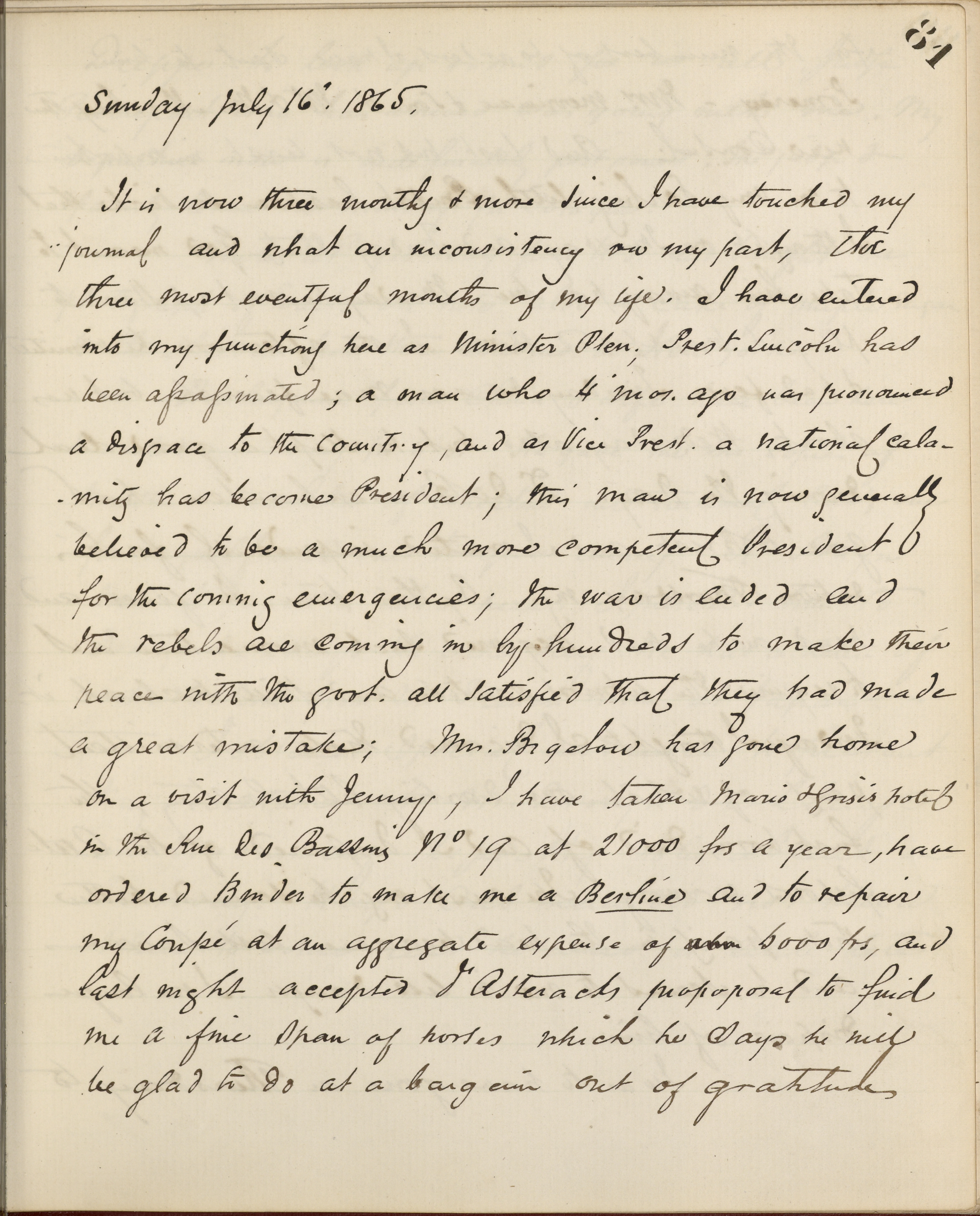
-
Description
John Bigelow was an American author, editor and diplomat. In 186, Abraham Lincoln appointed Bigelow as United States Consul becoming Chargé d'Affaires at Paris, France, as Minister to the Court of Napoleon III. In 1865, he was appointed American Ambassador to France. He sporadically kept a diary during this time and following a months long gap beginning in early April 1865. He returned to writing in July and notes the greatest change over the last few months being the Lincoln assassination.
-
Source
Manuscripts and Archives Division, The New York Public Library
-
Rights
This item is in the public domain and may be reproduced and used for any purpose, including research, teaching, private study, publication, broadcast or commercial use, with proper citation and attribution.
-
Creator
John Bigelow
-
Date
July 16, 1865
from Apr. 15, 1865
Susan B. Anthony's Diary
-
Full Title
Susan B. Anthony's Diary
-
Description
Susan B. Anthony was a women's rights activist and suffragette. Before and during the Civil War, she was also heavily involved in the anti-slavery movement. She wrote about the Lincoln assassination in her diary after she learned of the news on April 15th and over the following days.
-
Source
Library of Congress, Manuscript Division, Susan B. Anthony Papers
-
Rights
This item is in the public domain and may be reproduced and used for any purpose, including research, teaching, private study, publication, broadcast or commercial use, with proper citation and attribution.
-
Tags
-
Cite this Item
Susan B. Anthony. "Susan B. Anthony's Diary". Remembering Lincoln. Web. Accessed December 15, 2025. https://rememberinglincoln.fords.org/node/1189
-
Creator
Susan B. Anthony
-
Date
April 15, 1865
from Apr. 15, 1865
Susan B. Anthony's Diary

-
Description
Susan B. Anthony was a women's rights activist and suffragette. Before and during the Civil War, she was also heavily involved in the anti-slavery movement. She wrote about the Lincoln assassination in her diary after she learned of the news on April 15th and over the following days.
-
Source
Library of Congress, Manuscript Division, Susan B. Anthony Papers
-
Rights
This item is in the public domain and may be reproduced and used for any purpose, including research, teaching, private study, publication, broadcast or commercial use, with proper citation and attribution.
-
Creator
Susan B. Anthony
-
Date
April 15, 1865
from May. 1, 1865
O.J. Benham typescript diary
-
Full Title
O.J. Benham typescript diary
-
Description
The typescript copy of O.J. Benham's diary. Benham was a soldier in the Fourth Corps of the Army of the Cumberland. The diary spans February 24, 1865 to June 15, 1865, covering his time in the army. Along with his daily activities, he recorded news and rumors, including the news of the President's Assassination.
-
Source
the Duke University Libraries Digital Collections and the Duke Digital Repository
-
Rights
This item is in the public domain and may be reproduced and used for any purpose, including research, teaching, private study, publication, broadcast or commercial use, with proper citation and attribution.
-
Tags
-
Cite this Item
O.J. Benham. "O.J. Benham typescript diary". Remembering Lincoln. Web. Accessed December 15, 2025. https://rememberinglincoln.fords.org/node/1187
-
Creator
O.J. Benham
-
Date
April 1865
from May. 1, 1865
O.J. Benham typescript diary
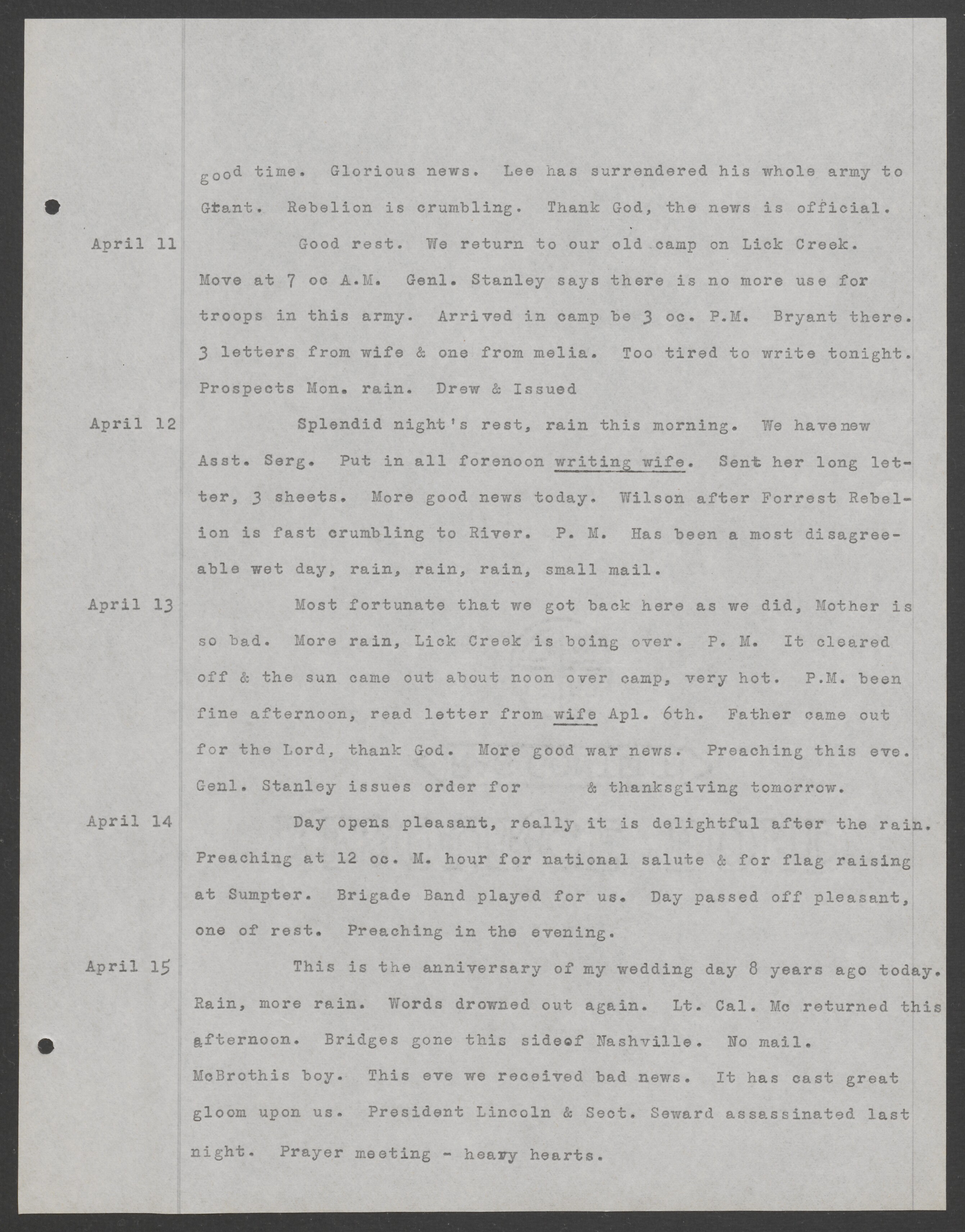
-
Description
The typescript copy of O.J. Benham's diary. Benham was a soldier in the Fourth Corps of the Army of the Cumberland. The diary spans February 24, 1865 to June 15, 1865, covering his time in the army. Along with his daily activities, he recorded news and rumors, including the news of the President's Assassination.
-
Source
the Duke University Libraries Digital Collections and the Duke Digital Repository
-
Rights
This item is in the public domain and may be reproduced and used for any purpose, including research, teaching, private study, publication, broadcast or commercial use, with proper citation and attribution.
-
Creator
O.J. Benham
-
Date
May 1, 1865
from May. 1, 1865
Letters of Jane Grey Swisshelm
-
Full Title
Excerpts from Crusader and feminist; letters of Jane Grey Swisshelm, 1858-1865;
-
Description
Jane Grey Swisshelm a journalist was the editor of the Cloud Visiter [sic] and, afterward, the St. Cloud Democrat. The Minnesota Historical Society collected and compiled the series of articles and letters written for the St. Cloud Democrat, publishing them as a book in 1934. Her letters from late April and early May 1865, express her grief over Lincoln's death and her fear for the country's future.
-
Source
Library of Congress, General Collections and Rare Book and Special Collections Division
-
Rights
This item is in the public domain and may be reproduced and used for any purpose, including research, teaching, private study, publication, broadcast or commercial use, with proper citation and attribution.
-
Tags
-
Cite this Item
Jane Grey Swisshelm. "Excerpts from Crusader and feminist; letters of Jane Grey Swisshelm, 1858-1865;". The Minnesota Historical Society. Remembering Lincoln. Web. Accessed December 15, 2025. https://rememberinglincoln.fords.org/node/1186
-
Creator
Jane Grey Swisshelm
-
Publisher
The Minnesota Historical Society
-
Date
April-May 1865
from May. 1, 1865
Excerpts from Crusader and feminist; letters of Jane Grey Swisshelm, 1858-1865;
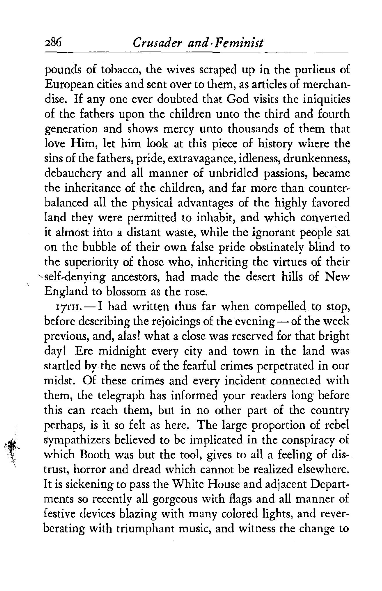
-
Description
Jane Grey Swisshelm a journalist was the editor of the Cloud Visiter [sic] and, afterward, the St. Cloud Democrat. The Minnesota Historical Society collected and compiled the series of articles and letters written for the St. Cloud Democrat, publishing them as a book in 1934. Her letters from late April and early May 1865, express her grief over Lincoln's death and her fear for the country's future.
-
Source
Library of Congress, General Collections and Rare Book and Special Collections Division
-
Rights
This item is in the public domain and may be reproduced and used for any purpose, including research, teaching, private study, publication, broadcast or commercial use, with proper citation and attribution.
-
Creator
Jane Grey Swisshelm
-
Publisher
The Minnesota Historical Society
-
Date
May 1, 1865
from May. 1, 1865
Journal of Elon Lee
-
Full Title
Journal of Elon Lee
-
Description
Elon Lee was a student at the Old University of Chicago in the 1860s. Lee wrote extensively in his journal and to his family about the Lincoln assassination and funeral, which he attended in Chicago
-
Source
Special Collections Research Center, University of Chicago Library
-
Rights
This item is in the public domain and may be reproduced and used for any purpose, including research, teaching, private study, publication, broadcast or commercial use, with proper citation and attribution.
-
Tags
-
Cite this Item
Elon Lee. "Journal of Elon Lee". Remembering Lincoln. Web. Accessed December 15, 2025. https://rememberinglincoln.fords.org/node/1185
-
Creator
Elon Lee
-
Date
April-May 1865
from May. 1, 1865
Journal of Elon Lee
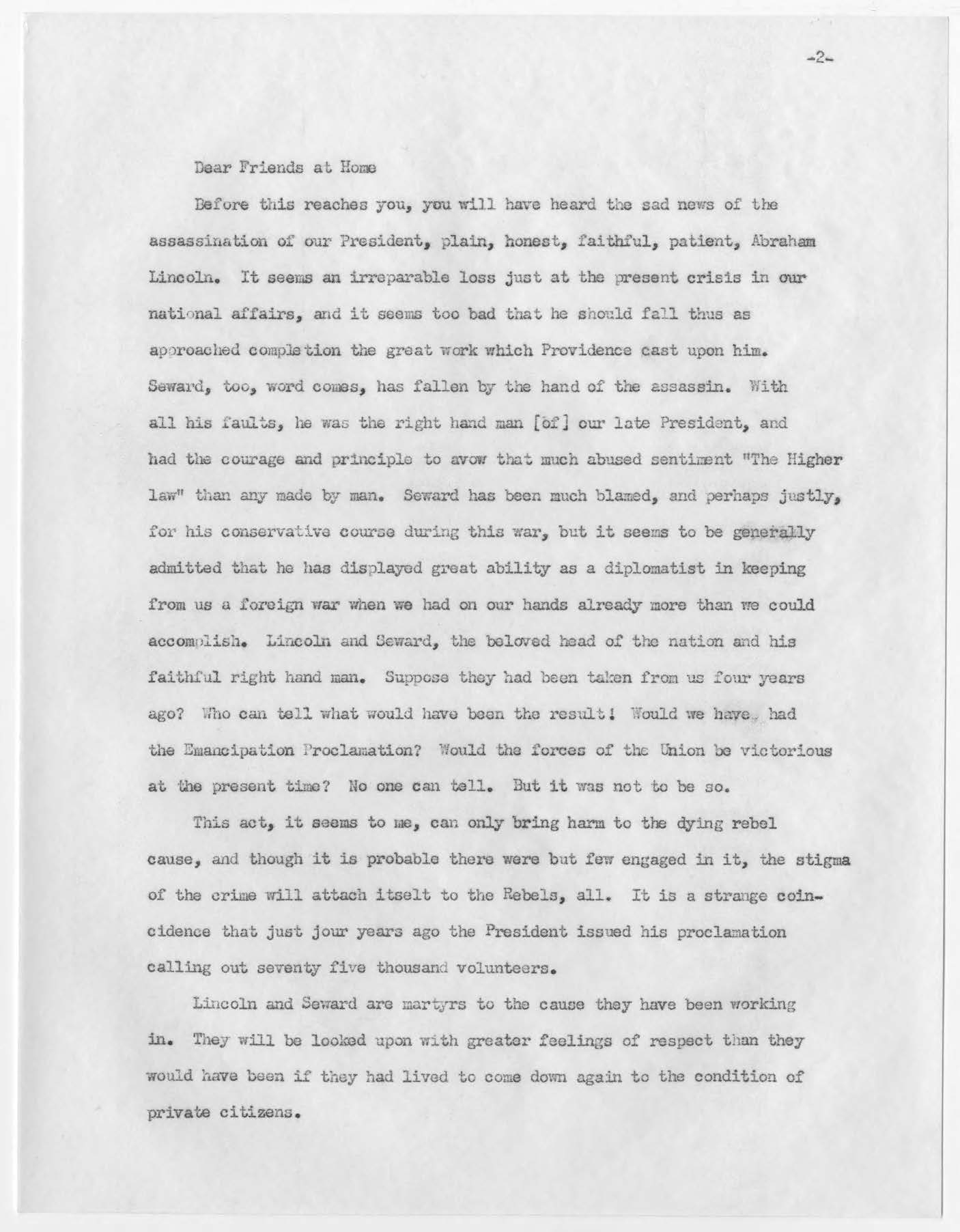
-
Description
Elon Lee was a student at the Old University of Chicago in the 1860s. Lee wrote extensively in his journal and to his family about the Lincoln assassination and funeral, which he attended in Chicago
-
Source
Special Collections Research Center, University of Chicago Library
-
Rights
This item is in the public domain and may be reproduced and used for any purpose, including research, teaching, private study, publication, broadcast or commercial use, with proper citation and attribution.
-
Creator
Elon Lee
-
Date
May 1, 1865